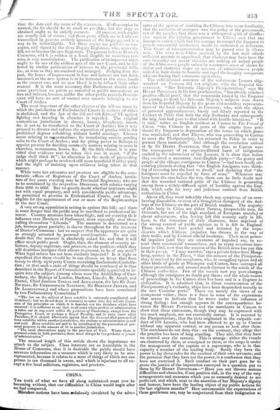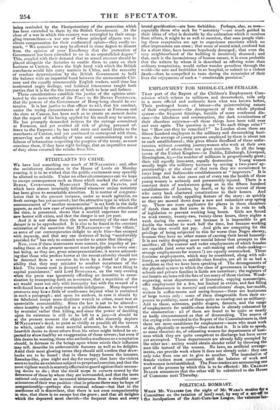CHINA.
THE truth of what we have all along maintained must now be becoming evident, that cur difficulties in China would begin after we had conquered.
Mistaken notions hate been sedulously circulated by the advc. cates of the system of drubbing the Chinese into more familiarity, that the exclusion of strangers was the policy of the government, not of the people ; that there was a widespread spirit of disaffec- tion against the existing government in China ; and that any European nation which had the courage to compel the Emperor to permit commercial intercourse would be welcomed as deliverers. This tissue of misrepresentation may be passed over in silence now. The news frons China received by the last mail affords sufficient grounds to apprehend, that whatever may have beets the case formerly; our recent victories are making an united people of the Chinese—a people united by a common sense of shame for defeat and vindictive anger on account of submission—a people united in their desire to humble and repel the haughty conquerors who are forcing their commerce upon them.
The cold-blooded massacre of the unfortunate Lascars ship- wrecked on Formosa did not originate with the Imperial Go- vernment. " Her Britannic Majesty's Plenipotentiary," says Sir Ilaxay POTTINGER in his first proclamation, "has already obtained positive official proof, that the commands issued by the Ensperot--- for putting to death her Britannic Majesty's subjects were drawn from his Imperial Majesty by the gross and merciless representa- tions of the local authorities in Formosa; who, with the object of personal aggrandizement, basely and falsely reported to the Cabinet at Pekin that both the ship Nerbudda and subsequently the brig Ann had gone to that island with hostile intentions." "It is said," writes an English resident at Canton to The Friend of C'hina, "the Chinese in all parts of the empire have peti- tioned the Emperor in deprecation of the terms on which peace was concluded; and that Elepoo, who was proceeding to Canton to meet the Plenipotentiary, has returned to Pekin in order to present these memorials." And although the conclusion arrived at by Sir Ilassay POTTINGER, that the riots at Canton were the consequence of an unpremeditated burst of indignation excited by the misconduct of the Lascars, it is clear that before they occurred a numerous Anti-English party—" the gentry and people of the villages contiguous to Canton "—had been busily cir- culating placards stating that "the English foreigners were think- ing of removing into the land to dwell," and declaring that "the foreigners must be expelled by force of arms." Whatever may have been the case befoie the war, there can be little doubt now that the wounded national pride of the Chinese is generating among them a widely-diffused spirit of hostility against the Eng- lish, which calls for wary and judicious conduct from British authorities in China.
Above all, they must inflexibly check any symptoms of an over- bearing disposition, or even of a thoughtless disregard of the feel- ings of the Chinese on the part of British traders. The majority of this body in China are either Parsees, (respectable men, for Orientals, but not of the high standard of European morals,) or clever adventurers, who, having left this country early in life, have, in the formation of their character, been deprived of the strong control of public opinion as it is felt in England. These men have been goaded and irritated by the impe- diments which Chinese prejudice has thrown in the way of their traffic, and by Chinese official insolence. Their most power- ful impulses (and they are creatures of impulse) are, to ex- tend their commercial transactions, and to repay vexatious inso- lence in kind, now that the success of the British arms has put this in their poaer. " I tnay mention," says a private letter from Hong- kong, quoted in the Times, " that the censure of the Plenipoten- tiary is merited by the merchants, who, in smuggling opium and all other kinds of goods at Whampoa and Canton, have outraged all former precedents, and created much distrust in the minds of the Chinese authorities. Few of the vessels now pay port-charges, although the consignees no doubt pay them; and the whole course of proceedings in the Canton river has been and is a disgrace to civilization. It is admitted that, in direct contravention of the Plenipotentiary's authority, ships have been despatched secretly to the new Consular ports." These are merely the views of an anonymous writer; there is a force in some of the expressions that seems to indicate that he wrote under the influence of strong feeling : but enough appears in the correspondence be- tween Sir Harsay POTTINGER and the merchants at Camon to show that these statements, though they may be expressed with too much emphasis, are not essentially untrue. It is asserted by the Plenipotentiary, that the riots originated in the culpable con- duct of 170 Lascars, who had been allowed to go up to Canton without any apparent control, or any person to look after them. The merchants do not deny this : on the contrary, they allege that the practice has been of long standing. They add, that they have no control over the seamen. This is strange: either the vessels are chartered by them, or consigned to them, or the cargo is under the management of the captain or a supercargo, who is in that capacity a member of the trading body. Surely they have the power to lay down rules for the conduct of their own servants; and the pretence that they have not the power, is a confession that they have not exercised it. Such conduct on their part goes far to prove the justice of the imputation conveyed in a question put to them by Sir Harms- POTTINGER—" Have you not thrown serious difficulties and obstacles, if not positive risk, in the way of the very arrangements and measures which you so earnestly desired to see perfected, and which, next to the assertion of her Majesty's dignity and honour, have been the leading object of my public actions for the last eighteen months?" How unreasonable the expectations of these gentlemen are, may be conjectured front their indignation at
being reminded by the Plenipotentiary of the protection which has been extended to them by the British Government. At the close of a war in which this country was entangled by their smug- gling transactions—a war one of whose principal objects was to obtain compensation for their confiscated opium—they coolly re- mark, "We conceive we may be allowed in some degree to dissent from the opinion of your Excellency that the protection of Government has been extended to us in an unparalleled degree." This, coupled with their demand that an armed steamer should be placed alongside the factories to enable them to carry on their business at Canton, shows the high hand with which the British merchants would fain carry matters in China, and the necessity of resolute determination by the British Government to hold the balance with an impartial hand between the unreasonable Chi- nese and the equally unreasonable English traders, until time has moderated angry feelings, and habitual intercourse taught both parties that it is for the the interest of both to bear and forbear.
These considerations establish the justice of the opinion attri- buted by the news-writer of the Times to Sir HENRY POTTINGER, that the powers of the Government of Hong-kong should be ex- tensive. It is but justice to that officer to add, that his conduct, under the trying circumstances of the massacre at Formosa and the riots at Canton, has been such as to create an earnest desire that the report of his having applied for his recall may be untrue. He has promptly demanded redress for the outrage committed at Formosa, and yet avoided all risk of giving personal of- fence to the Emperor ; he has told stern and useful truths to the merchants of Canton, and yet continued to correspond with them, preserving such an urbanity of tone and communicating such a fulness of information respecting the progress of the treaty, as must convince them, if they have right feelings, that an imperative sense ef duty alone extorted the rebuke from him.



























 Previous page
Previous page